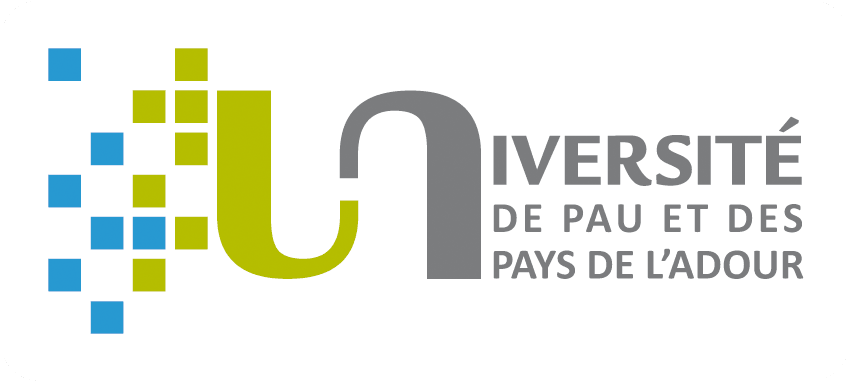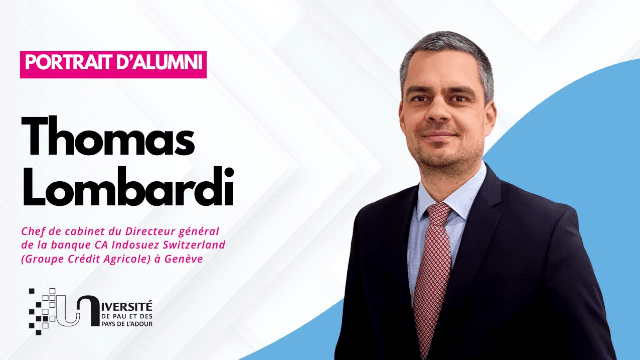Thomas Lombardi, Chief of Staff to the CEO of CA Indosuez Switzerland (Crédit Agricole Group) in Geneva
Graduated with a Bachelor's degree in Economics and Management from UPPA, a Master's in Finance in Switzerland, and an MBA from Columbia University in New York, Thomas Lombardi began his career in asset management in Paris before joining the Crédit Agricole Group.
Why did you choose a Bachelor's degree in Economics and Management at UPPA?
I stayed in Pau because it was simpler and more economical (I am originally from Pau and was already living there). It aligned well with my expectations as a young student at the time, even though I knew I would eventually have to move to complete my training in financial markets and find my first job in this sector.
My background is somewhat atypical, as I first completed a BEP in Sales and then an STT high school diploma before enrolling in the Economics program. Compared to other students who came from ES and scientific backgrounds, I had to catch up in mathematics to reach the required level.
In hindsight, I would say that this Economics and Management degree provides an excellent foundation of technical skills, essential for the future, as these are not things one learns "on the job" in a company, unlike other skills. This initial training, supplemented by a Master's in Finance in Switzerland (taught in English and in a highly international class), allowed me to find my first job in Paris in the field of asset management. Whether for further studies or my profession later on, I quickly realized the advantage of these technical skills acquired during my Economics degree (especially all the options that may be unpopular among students but are truly differentiating, such as econometrics, macroeconomics, mathematics, and statistics).
What was your professional journey after your studies?
Having had the brilliant idea of looking for a job in finance in 2009 (at the height of the financial crisis…), the beginnings were not easy, but I was fortunate to find an opportunity in the asset management sector in Paris and, most importantly, to join the Crédit Agricole Group in early 2012. I wanted to continue my career in a large international bank, and Crédit Agricole Pyrénées Gascogne (the Regional Bank of the Group covering departments 64, 65, and 32) offered me numerous opportunities, including the ability to work in this field locally (as the vast majority of these positions are in Paris). Over ten years (2012-2022), I successively held the positions of Head of Investment Advisory Services, Chief Economist, and Director of the Private Banking division. I then continued within the Crédit Agricole Group in Geneva at CA Indosuez Switzerland, our wealth management subsidiary. Before that, I had also completed my training with an MBA at Columbia University (New York).
Two or three words you associate spontaneously with UPPA?
Friendship – Among my closest friends, several are people I met at UPPA. I have great memories of university life both on and off campus.
Autonomy – University fosters independence, with periods that can be intense and others less so, along with frequent exam periods where you must perform on the day.
It is also an environment where students must take charge of part of their education, develop their curiosity, and push their research beyond the taught content. This nurtured my interest in many subjects, including finance and economics.
Mathematics – It was during this period that I acquired these skills and truly understood their usefulness, which is essential in our professions. It also represents the majority of studying and assignments for an economics student—I remember spending hours deriving endless functions or solving equations without numbers.
Any advice for UPPA students at the start of their studies?
I would advise them to look more closely at the careers they would like to pursue and to quickly tailor their studies, options, and internships in that direction. It is difficult to project oneself at the beginning of a degree, but this is a necessary reflection to have from the first months to quickly orient oneself and have as precise a goal as possible.
Upon graduation, I believe it is crucial to focus on the final-year internship to secure a first job, as this is the most challenging step and can take time. Ideally, I would recommend a large company, as it allows for broader horizons regarding different professions and geographical opportunities, with better training and internal support. In my case, after initially working in smaller structures, I was fortunate to join a large group. I take this opportunity to remind students that the banking sector offers numerous opportunities, not only in finance but also in areas such as IT, human resources, renewable energy, and real estate. This applies to other sectors as well—many large companies today operate across multiple industries beyond their original field.
And lastly, the most important advice: do something you are passionate about (or at least something that interests you). This is the best way to thrive at work and succeed. If that is not the case, do not hesitate to change direction—today’s environment makes it much easier than it was 20 or 30 years ago.
Learn more?
Economics and Management Bachelor's Degree
Comments0
Please log in to see or add a comment
Suggested Articles


